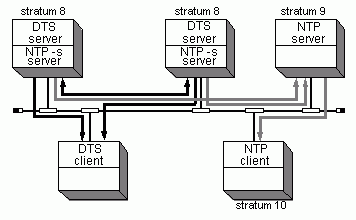Giving the Time to NTP Nodes
Any DTS server or clerk that runs the ntpd daemon or the xntpd daemon with the -s option and a special configuration file (ntp.conf) can be configured as an NTP server.
For systems running the ntpd daemon, the ntp.conf configuration file must contain the following line:
peer /dev/null DTSS 8 -5 local
In addition, add -s to the ntpd entry in the file /sbin/init.d/ntpd or, for systems with rc.local, modify the line that starts ntpd accordingly.
For systems running the xntpd daemon, the ntp.conf configuration file must contain the following line:
peer 127.127.1.8
In addition, add -s to the xntpd entry in the file /sbin/init.d/xntpd or, for systems with rc.local, modify the line that starts xntpd accordingly.
In this configuration, NTP never sets the clock. NTP can, however, give the time to other NTP clients. Do not allow loops between DTS and NTP to form. If NTP gives the time to DTS, then DTS gives the time back to the same set of NTP servers, unexpected results can occur.
The NTP configuration file is set up to ensure that an NTP server that obtains the time from DTS is a Stratum 8 node. In addition, dts_ntp_provider is prohibited from accepting time from a node at Stratum 8 or higher.
A DTS (server) node can give time to an NTP node if the following rules and advisories are observed:
· Rule - The ntp.conf file must declare this node at Stratum 8.
· Advisory - Multiple nodes in the set can be running ntpd -s or xntpd -s.
· Advisory - If any DTS-managed system has a local time source, that system should be used as an NTP -s server.
· Advisory - Although this operation can occur on either a DTS server or a DTS client node, a DTS server is preferred.
Note: If null providers are used, the rules in Getting the Time from Local NTP Time Sources must also be followed, since null providers running on NTP nodes can bypass the stratum check.
The following figure shows two DTS server nodes running ntpd -s and providing time to an NTP subnetwork. The ntp.conf file defines these servers at Stratum 8.
Giving the Time to NTP
